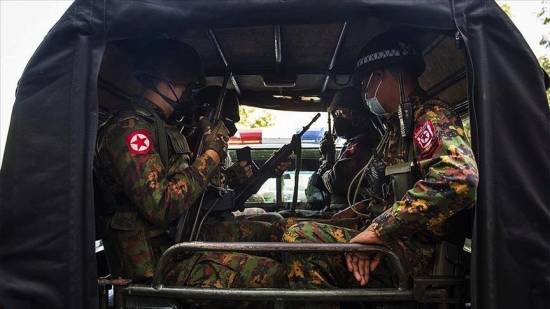The UN Human Rights Council began a special session Friday following the seizure of power in Myanmar by the military, with the coup widely condemned there.
"The seizure of power by the Myanmar military earlier this month constitutes a profound setback for the country, after a decade of hard-won gains in its democratic transition," Nada al-Nashif, the deputy high commissioner for human rights, said at the start of the debate called by the EU and the UK.
Gains made by Myanmar had been reviewed by the HRC less than three weeks earlier in its Universal Periodic Review.
That "had been reinforced by the clear results of the general elections of November 2020 -- now effectively betrayed by the coup -- and the declaration of a one-year State of Emergency," said al-Nashif.
Myanmar's democratically elected political leadership, including de facto leader Aung San Suu Kyi and President Win Myint, have been detained on "politically motivated charges."
"Additionally, the military authorities must not be allowed to exacerbate the situation of the Rohingya people, after the extreme violence and decades of discrimination that they have endured," said the HRC official.
She called on the military authorities "to return power to civilian control and to immediately release all individuals arbitrarily detained."
Myanmar's military declared a state of emergency on Feb. 1, hours after detaining Wyint, Suu Kyi, and senior members of the ruling National League for Democracy (NLD).
U Myint Thu, Myanmar’s ambassador to the UN in Geneva, said: "In light of the post-election irregularities and the following complex situation in the country, Tatmadaw (the Myanmar military) was compelled to take the State responsibilities, in accordance with the State Constitution."
Rui Macieira, Portugal's envoy to the UN in Geneva, said, however, the military takeover threatens to reverse 10 years of democratic transition.
"To remain silent about violations of fundamental human rights, such as freedom of opinion and expression, religion or belief, and association and assembly, is not an option," he said.
Sadik Arslan, the Turkish ambassador to the UN in Geneva, said: "We are deeply concerned about and strongly condemn the military takeover that took place in Myanmar. Turkey is against any kind of coup d'etats and military interventions as a matter of principle.
"We hope that this grave development will not worsen the plight of Rohingya Muslims living in Myanmar."
The US made its first statement since it announced on Monday it would re-engage with the HRC as an observer after the administration of former President Donald Trump withdrew from the body in 2018.
Mark Cassayre, charge d'affaires of the US mission in Geneva, said Washington condemns the military's coup against "the democratically elected government of Myanmar."
Urging targeted sanctions against coup leaders, he called on HRC members to "urge the military to immediately release all those unjustly detained, including politicians, civil society representatives, journalists, foreign nationals, and human rights defenders."
The HRC does not have the power to impose sanctions on individuals or states, which the UN Security Council can do.
A Russian delegate opposing the debate said: "We believe that attempts to face the latest events which are linked to the declaration of the state of emergency on the human rights plane is hardly justified and very political."
As well as EU countries in the 47-strong HRC, the request for the debate was also supported by states such as Australia, Canada, Costa Rica, Japan, Israel, New Zealand, Norway, South Africa, Switzerland, Turkey, Pakistan, the US, and other nations.
China, Belarus, Cuba, Eritrea, the Philippines, Russia, and Venezuela said they opposed holding the special session./aa


